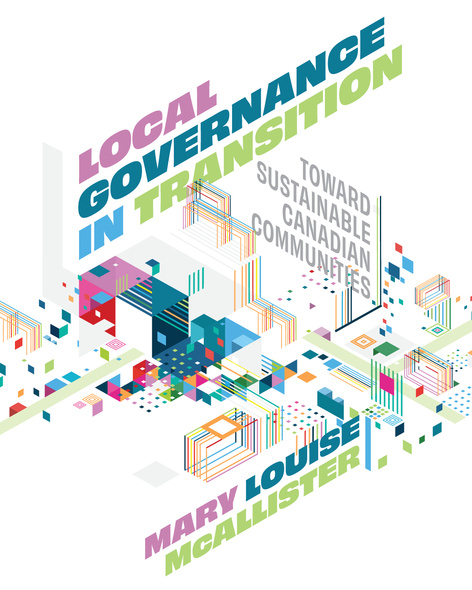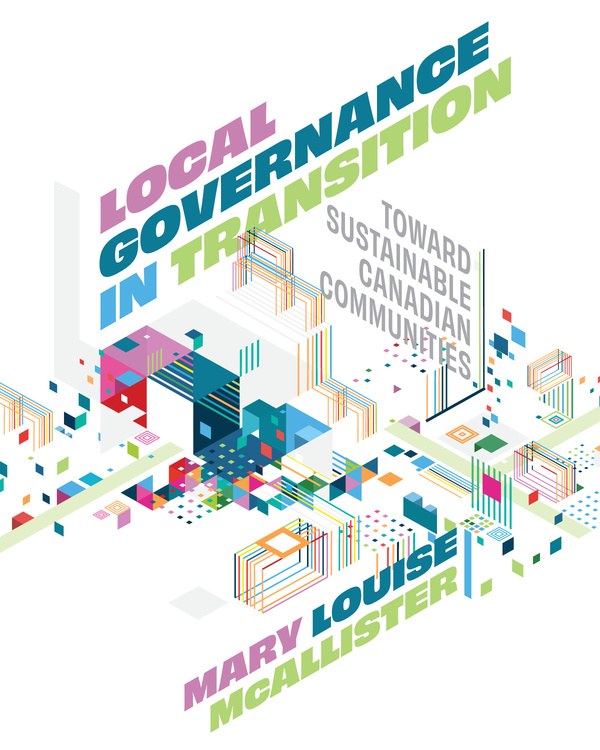
Local Governance in Transition
Toward Sustainable Canadian Communities
The early 2020s unleashed a perfect storm on local governments around the world, posing logistical challenges many administrations had never anticipated. Where some communities flailed, others thrived. Epidemics, natural disasters, and economic collapses inspired innovative thinking and creativity from resourceful civic teams who embraced technology, sustainability, and diversity.
In Local Governance in Transition, author Mary Louise McAllister argues that communities hoping to thrive in the future must reimagine what local governance can achieve today. She begins with an overview of how governance evolved in Canada, before examining how interdisciplinary initiatives and policies can nudge cities toward a more sustainable future. From coast to coast to coast, climate change poses existential challenges for Canadian communities. Global awareness and working collaboratively is proving key in finding creative solutions for local governance and sustainability.
McAllister’s Local Governance in Transition examines socio-ecological thinking, environmental studies, and the mechanics of government. It discusses the impacts of information and technological systems, collaborative urban planning and policymaking, healthy communities and social justice, and institutional learning. It’s an essential text for anyone working toward sustainable cities.
Anyone working toward better governance and a more sustainable future – as well as students in urban planning, environmental studies, and political sciences – will find much to consider in Local Governance in Transition, as will civil servants, political leaders, academics, and those in related civic management fields.
Local Governance in Transition does an excellent job of bringing together a range of disparate elements and themes, and discussing their roles in sustainability transitions at the local level. Given the absence of any comparable, Canadian-oriented text in this area, and the growing interest in decentralized, locally based responses to challenges like climate change, this book is very useful.
Local governance could be Canada’s ace in the hole when it comes to surviving global disruptions, and this book reveals how the synergy between ecology, geography, history, and politics can help to enable such a sustainable future.
Mary Louise McAllister is an adjunct professor and associate professor emerita at the School of Environment, Resources and Sustainability at the University of Waterloo. In 2015, she received Waterloo’s Distinguished Teacher Award in 2015. Her prior books include 2004’s Governing Ourselves? The Politics of Canadian Communities, which won the Choice Award for Outstanding Academic Title in 2005. McAllister resides in Waterloo, where she continues to sit on university graduate theses committees.
Preface
Introduction
Part 1: Through Time and Space: Canadian Local Government
1 Sustainable Communities: Governance in a Complex Era
2 The Historical Legacy: The Evolution of Canadian Local Government
3 Federalism and Multi-level Governance: Intergovernmental Relations
4 Governing Ourselves: Who Decides, How, and for Whom?
5 Expanding Civic Engagement: Local Democracy in the 2020s
6 Decision Making at City Hall: The Machinery of Government
Part 2: Networks and Partnerships: Connected Cities and Overlapping Responsibilities
7 Bridging the Silos: Systems Thinking at City Hall
8 Beyond Boundaries: Network Governance
9 Changing Climates: Local to Global Interactions
10 Networked Cities: Communications and Smart Cities
Part 3: Reimagining Local Governance: Transitioning toward Sustainability
11 Sustainable Landscapes: Ecosystem Services, Natural Assets, and Food Systems
12 Regenerative Infrastructure: Linear to Circular Systems
13 Healthy Cities: Well-Being, Diversity, and Inclusion
14 Diversifying Local Economies: Valuing Community Assets
15 Learning Communities: Adaptive and Innovative Governance
Reflections: Local Governance in Transition
References; Index










